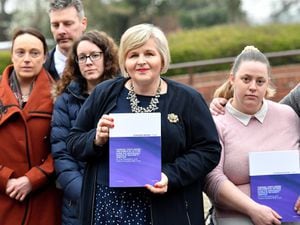Minister remains silent on baby deaths as grieving Shropshire families demand nation-wide inquiry
Grieving parents today joined together to demand a nation-wide inquiry into baby deaths.

Two separate campaigns have been launched with the same aim – to persuade Health Secretary Steve Barclay to respond to calls for a national probe on maternity units.
Shropshire campaigners Rhiannon Davies and Richard Stanton have set up a petition demanding action. The couple were among those whose baby died because of failings within Shrewsbury and Telford NHS trust. They revealed they have yet to receive a reply to a letter they sent to Mr Barclay.
Parents with similar experiences in other parts of the country today launched a Maternity Safety Alliance campaign. It has also sent Mr Barclay a letter outlining its aims, saying: “Fundamental reform is needed. Over and over again we hear ‘lessons will be learned’ – and yet those same failings continue.”
The Department of Health and Social Care said it has invested £165 million a year since 2021 to improve midwife numbers and that the Care Quality Commission is inspecting all maternity services that have not been inspected and rated since April 2021. The Department did not say why Mr Barclay had not responded to the letter from Ms Davies and Mr Stanton.
Reports into failings at Shrewsbury, Telford, Morecambe Bay and East Kent have painted a damning picture of poor care and concerns over the culture on NHS maternity wards.
Donna Ockenden, who led the review at Shrewsbury and Telford Hospital NHS Trust, is currently leading an independent review of maternity services at the Nottingham University Hospitals NHS Trust.
Parents in Leicester have also called for an independent review into its maternity units following the deaths of their babies.
Now, the Maternity Safety Alliance has written to Mr Barclay setting out the case for a national inquiry.
Rhiannon Davies, Richard Stanton and Kayleigh and Colin Griffiths, whose daughters died due to failings at Shrewsbury and Telford, wrote to Mr Barclay in September calling for a national inquiry but Ms Davies said they have yet to receive a reply.
They have launched a petition calling for an inquiry on Change.org, saying said they want a "review that leaves no stone unturned".
Rhiannon Davies and Richard Stanton began campaigning after their baby Kate died following delays transferring her from Ludlow Community Hospital to a doctor-led maternity unit in March 2009.
Mr and Mrs Griffiths' daughter Pippa died from a Group B Streptococcus infection a day after being born at home in Myddle in 2016.
Mrs Davies said it was essential that the national picture is looked at, saying an inquiry should "peel back every single layer to get a full picture of where learning needs to happen".
The Maternity Safety Alliance campaign is also backed by parents including Emily Barley, whose daughter Beatrice died in 2022 at Barnsley Hospital after staff mistakenly monitored her heart rate instead of the baby's.
The letter is also signed by Jack and Sarah Hawkins, who were instrumental in bringing failings at Nottingham University Hospitals NHS Trust to light following the death of their daughter, Harriet; and national patient safety campaigner James Titcombe, whose son Joshua died at Morecambe Bay.
The letter said: "We are writing to you to demand a full statutory public inquiry into maternity safety in England.
"Our babies are too precious to keep on ignoring the reality that, despite a raft of national initiatives and policies implemented in the wake of investigations and reports, systemic issues continue to adversely impact on the care of women and babies.
"Far too much avoidable harm continues to devastate lives in circumstances that could and should be avoided. Fundamental reform is needed.
"Over and over again we hear that 'lessons will be learned' - and yet those same failings continue. And they don't just continue in isolated corners of the NHS, they are present to some degree in almost every NHS trust in England, with the most serious kind of avoidable harm occurring everywhere."
The families argue that only a judge-led, full statutory public inquiry can command the confidence of families and others involved, and come to independent conclusions "free of party politics".
Ms Barley said: "We think the investigations and local level inquiries that have taken place are great and really useful...
"The problem for us is that the failings in maternity are much broader than these local units. They're not isolated problems, it's a system wide problem.
"We think we need a whole system analysis to really understand what's going on and how it can be fixed.
"And we want that to include not just what's happening in hospitals, but what's happening around it as well, so at the regulators, in terms of governance, the way we learn from incidents - we think all of it needs to be looked at.
"The local investigations have been good but they haven't fixed the problem...We're seeing investigations years apart that are finding pretty much the same thing."
She said the culture within the NHS was one of the biggest issues, including the focus in NHS trusts on "reputation management".
She added there was "a kind of cultural acceptance of failure, an inevitability, even when it's avoidable."
Mr Titcombe said: "Not a week goes by without a tragic story being reported in the news - each time with the same promise that 'lessons will be learned', yet the stories I hear from so many families today often have similar features as our experience in losing Joshua 15 years ago."
He said there must now be an acceptance that the problems are "not limited to isolated 'unit level' issues but rather reflect systemic problems that exist across the maternity system as a whole".
He added: "Once we accept this as a starting point, it's clear that future inquiries at an individual service level will only ever get us so far - no matter how many we have."
Mr Titcombe said a national inquiry could look at the whole system, examine the impact of previous inquiry recommendations and look at international examples of safer maternity systems "and what we could learn from them".
An England-wide review could also help identify and better understand the barriers to progress and "how they might be overcome".
The Department of Health and Social Care has been contacted for comment.





